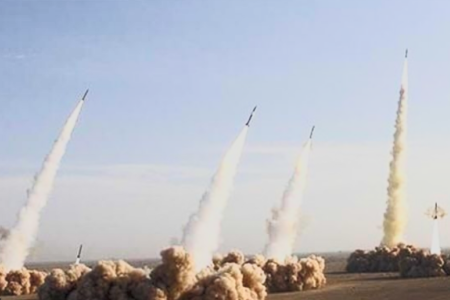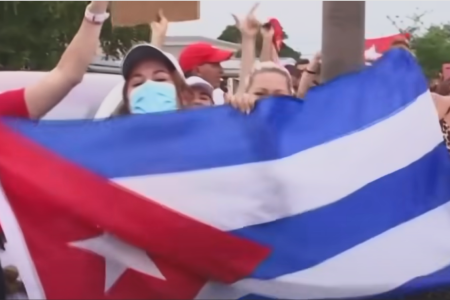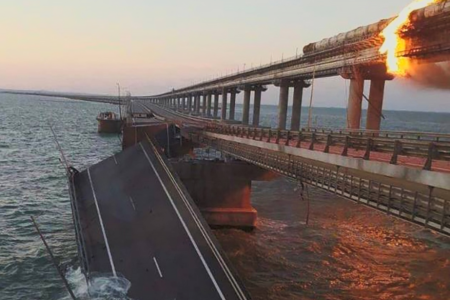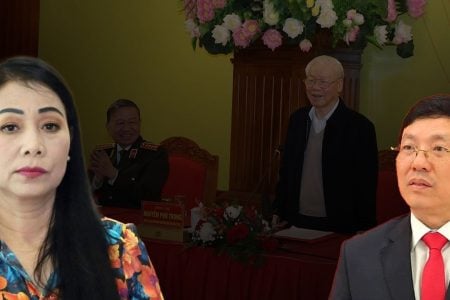US Secretary of State Mike Pompeo on Monday rejected most of China’s claims in the South China Sea (Vietnamese call it East Sea). The two experts commented to VOA that the position taken by Pompeo showed that Washington is increasing the pressure in strategic competition with Beijing and this step paved the way for the US to act “stronger” in the South China Sea.
The State Department’s website on July 13 published Secretary of State Pompeo’s statement stating “Beijing’s claims to marine resources in most of the South China Sea are completely illegal, similar to their bullying campaign to control those resources.”

In a paragraph of the statement referring to Vietnam, the head of the US diplomacy said: “The US rejected any claims in the waters surrounding the Vanguard Bank (off Vietnam), Luconia Shoal (off Malaysia), waters in the Exclusive Economic Zone (EEZ) of Brunei, and Natuna Besar (off Indonesia).
The top diplomat of the world’s No. 1 superpower noted to China that “The world will not allow Beijing to treat the South China Sea as if it were its maritime empire,” and he warned that ” The US works closely with its Asian allies and partners in protecting their sovereignty rights over marine resources.”
Two Vietnamese researchers Hoang Viet in Vietnam and Le Hong Hiep in Singapore commented to VOA that Pompeo’s statement was caused by the increasingly intense strategic competition between the US and China, of which the South China Sea is an important part and can be considered as a “battlefield.”
Master Hoang Viet, an expert on the law of the sea, said that unlike previous years, when US statements made ASEAN countries feel not strong enough and the US “was not interested,” the US Secretary of State issued a strong statement to halt China’s ambition, and at the same time, encourage the countries concerned in the region to “stand up and defend their right.”
Viet anticipates that the US will take stronger action in the South China Sea but not to the extent of military conflict, which he thinks both the US and China want to avoid because they both understand that “can lead” to World War 3.

Dr. Le Hong Hiep of the ISEAS Institute Yusof Ishak assessed that Pompeo’s statement was the next step in the US strategy to reject China’s claims, thereby establishing the image of China as the country having illegal actions in the South China Sea, undermining Beijing’s position and influence; meanwhile, elevate America and its allies in the region.
The trend of further confrontation between the US and China in the South China Sea after the July 13 statement is “entirely possible,” Hiep said. He said that both the US speech and field action in the future will be “stronger, more assertive.“
According to the Singapore-based researcher, although the US Secretary of State’s statement is intended to serve the interests of the great power itself, it is also “good” for the interests and desires of ASEAN countries, including Vietnam.
However, Dr. Hiep said that it is likely that Vietnam will not publicly support Pompeo’s statement to avoid being accused of “choosing a side.”
Master-lawyer Hoang Viet judged that the US Secretary of State’s statement created an advantage for Vietnam, but whether Hanoi could take advantage of it would have to wait for a response.
The July 13 statement of the US position on China’s claims in the South China Sea marks Washington’s departure from its previous policy of not taking sides in the South China Sea dispute.
The US does not claim sovereignty over this maritime area and has often called on the parties concerned to resolve disputes peacefully, in accordance with international law.

On July 13, US Secretary of State Mike Pompeo announced that the United States supported a free and expanding Indo-Pacific region, and that Beijing’s claim of resources over most of the South China Sea was completely illegal as well as bullying campaigns to control this area are illegal.

Secretary of State Pompeo emphasized that the US shares profound benefits with many allies and partners who have long supported the rule-based international order.
These shared benefits, according to the US Secretary of State, are under an unprecedented threat from China. Pompeo accuses Beijing of using intimidation to undermine the sovereignty of Southeast Asian coastal states in the South China Sea, bullying countries away from offshore resources, imposing unilateral dominance and replace international law in a “win and win” style. People have clearly seen the way of Beijing for many years, US Secretary of State said and cited former Chinese Foreign Minister Yang Jiechi in 2010 before ASEAN partners that “China is a big country and other countries are small countries, that’s the truth.” China’s view of invading the world has no place in the 21st century, Pompeo said.
According to Pompeo, China has no legal basis to impose unilateral will on the region and has not provided an appropriate legal basis for the “Nine-dash Line” in the South China Sea since the officially announced in 2009.
Pompeo reminded that in the decision on July 12, 2016, the Arbitral Tribunal was set up under the 1982 Law of the Sea Convention to which China is a party that rejected China’s unfounded maritime claims in accordance with international law and on the side of the Philippines, the country brought the matter to arbitration.

“Beijing uses intimidation to undermine the sovereignty of coastal states in Southeast Asia, bully them in offshore resources, assert unilateral dominance and replace national law. “This approach of Beijing has been evident for many years. In 2010, the PRC’s Foreign Minister Yang Jiechi declared to China. ASEAN peers said that “China is a big country and other countries are small countries and that is the truth.”
“The 21st century has no room for the vicious worldview of the PRC.”
“The PRC has no legal basis to unilaterally impose its will on the region. Beijing has not provided any clear legal basis for the” U-shaped line “claim in the South China Sea since when they were officially announced in 2009. In a consensus decision of July 12, 2016, the Arbitral Tribunal was established under the 1982 United Nations Convention on the Law of the Sea – of which the People’s Republic of China is a member – rejected China’s maritime claims because it was not based on international law. The Arbitration Court sided with the Philippines, the party who brought the case to the Arbitral Court, in most of the country’s claims this.”
A statement on the State Department’s website quoted Secretary of State Pompeo stating that the US is on the side of the Court’s decision regarding maritime claims in the South China Sea:
– China cannot legally claim maritime sovereignty – including any Exclusive Economic Zone (EEZ) arising from Scarborough Shoal and Truong Sa (Spratlys) compared to the Philippines in areas where the Court issues are currently in the EEZ of the Philippines or on the continental shelf of this country. Beijing’s harassment of fisheries and the exploitation of Philippine offshore energy in these areas is illegal, as well as any unilateral Chinese activity to exploit those resources. Along with the court’s legally binding decision, China does not have legal maritime or territorial sovereignty in Mischief Reef or Co May, both of which belong to the sovereignty and jurisdiction of the Philippines. Nor does Beijing have territorial or maritime sovereignty over these entities.
– Because Beijing cannot make a logical and legal claim in the South China Sea, the US rejected any Chinese claim of territorial sovereignty outside of 12 nautical miles from the China-claimed islands in Spratlys. Therefore, the US rejected any claim in the waters around the Vanguard Bank off Vietnam, Luconia Shoal off Malaysia, the waters in the EEZ area of Brunei and Natuna Besar off Indonesia. Any act of China harassing the fishing or oil exploitation of other countries in these waters – or conducting such unilateral activities is illegal.
-China has no legal territorial or maritime sovereignty over (or derives from) James Underground, a fully submerged entity located only 50 nautical miles from Malaysia and 1,000 nautical miles from the Chinese coast. The James Shoal is often recorded in Chinese propaganda materials as “China’s southernmost territory.” International law is clear: An underwater entity like James’s Reef cannot be claimed by any country and cannot create territorial waters. The James Shoal (submerged nearly 20 meters below the surface of the ocean) is not and never is Chinese territory, nor can Beijing assert legal maritime rights from this underground entity.
Thoibao.de (Translated)



























